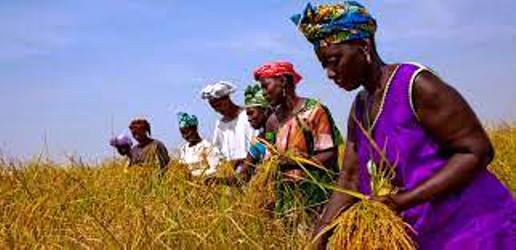The Small-Scale Women Farmers Organisation in Nigeria (SWOFON) has called on federal, state and local governments to stop spending money on other sectors but channel resources to security and agricultural sector.
The National President of SWOFON, Mrs Fatima Gummi made this submission in Abuja at a parley tagged “The Impact of the Current Economic Hardship and Food Crises and Inflation on Smallholder Women Farmers in Nigeria.”
The event was organised by SWOFON and supported by ActionAid Nigeria (AAN).
Gummi said such measure would address the current economic hardship, food crises and security challenges bedeviling the country.
She decried the alarming insecurity in the country, adding that the menace had made smallholder women farmers vulnerable thereby making it difficult for them to access farmlands and incurring losses.
Gummi, however, recommended that government should declare state of emergency on insecurity that was preventing smallholder farmers especially women from accessing their farms.
According to her, the current hardship has led to lower crop yields and reduced market access, resulting in decrease in incomes for smallholder women farmers.
“The conditions of livelihood of most smallholder women farmers are deteriorating, reaching a point where we struggle to provide food, access healthcare, and afford our children’s education.”
She attributed the rise in food or inflation on a year-on-year basis to increase in prices of bread and cereals, potatoes, yam and other tubers, oil and fat, fish, meat, fruit, coffee, tea, and cocoa.
“SWOFON deems it imperative to highlight the severe effects on smallholder women farmers across Nigeria.
“In spite of President Bola Tinubu’s declaration of a state of emergency on food security in July 2023, the situation persists unabated.
“According to recent data from the National Bureau of Statistics, the food inflation rate in January 2024 was 35.41 per cent on a year-on-year basis.
”The figure was 11.10 per cent points higher compared to 24.32 per cent recorded in January 2023.”
Gummi said that the 2024 Cadre Harmonise Food Security report predicted that approximately 31.5 million Nigerians would face food crisis situations between June and August with 24.7 million already grappling with such conditions from March to May.
“The present high cost of living and the removal of fuel subsidies has resulted in increased transportation for both farm produce and inputs, thereby causing a decline in the productivity of smallholder women farmers.
“The rising costs of feed and medication for livestock are severely affecting smallholder women farmers, threatening our ability to sustain livestock farming operations as we cannot afford to buy these essentials for our farming activities.”
The president said that women farmers across had not received the palliatives shared by the government to cushion the current economic hardship and food inflation.
“The exorbitant prices of agricultural inputs like fertilisers, herbicides, and pesticides are contributing to diminished agricultural productivity and decreased engagement in farming activities.
“There is increase in both manual and mechanised labour costs which smallholder women farmers are not able to afford,” she said.
NAN


